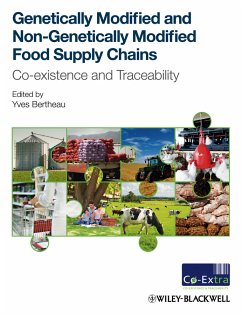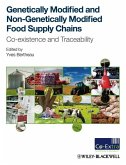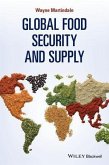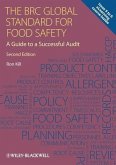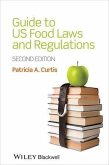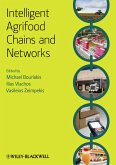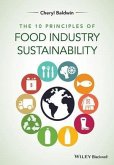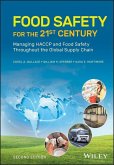Genetically Modified and non-Genetically Modified Food Supply Chains (eBook, PDF)
Co-Existence and Traceability
Redaktion: Bertheau, Yves


Alle Infos zum eBook verschenken

Genetically Modified and non-Genetically Modified Food Supply Chains (eBook, PDF)
Co-Existence and Traceability
Redaktion: Bertheau, Yves
- Format: PDF
- Merkliste
- Auf die Merkliste
- Bewerten Bewerten
- Teilen
- Produkt teilen
- Produkterinnerung
- Produkterinnerung

Hier können Sie sich einloggen

Bitte loggen Sie sich zunächst in Ihr Kundenkonto ein oder registrieren Sie sich bei bücher.de, um das eBook-Abo tolino select nutzen zu können.
In the European Union nations, and other countries including Japan, Australia and Malaysia, it is a legal requirement that food products containing genetically modified organism (GMO) materials are labelled as such in order that customers may make informed purchasing decisions. For manufacturers and consumers to be confident about these assertions, systems must be in place along the entire food chain which support the co-existence of GM and non GM materials whilst maintaining a strict segregation between the two. This book is an output of a European Union-funded project entitled "Co-Extra: GM…mehr
- Geräte: PC
- mit Kopierschutz
- eBook Hilfe
- Größe: 20.9MB
![Genetically Modified and non-Genetically Modified Food Supply Chains (eBook, ePUB) Genetically Modified and non-Genetically Modified Food Supply Chains (eBook, ePUB)]() Genetically Modified and non-Genetically Modified Food Supply Chains (eBook, ePUB)188,99 €
Genetically Modified and non-Genetically Modified Food Supply Chains (eBook, ePUB)188,99 €![Global Food Security and Supply (eBook, PDF) Global Food Security and Supply (eBook, PDF)]() Wayne MartindaleGlobal Food Security and Supply (eBook, PDF)59,99 €
Wayne MartindaleGlobal Food Security and Supply (eBook, PDF)59,99 €![The BRC Global Standard for Food Safety (eBook, PDF) The BRC Global Standard for Food Safety (eBook, PDF)]() Ron KillThe BRC Global Standard for Food Safety (eBook, PDF)87,99 €
Ron KillThe BRC Global Standard for Food Safety (eBook, PDF)87,99 €![Guide to US Food Laws and Regulations (eBook, PDF) Guide to US Food Laws and Regulations (eBook, PDF)]() Guide to US Food Laws and Regulations (eBook, PDF)77,99 €
Guide to US Food Laws and Regulations (eBook, PDF)77,99 €![Intelligent Agrifood Chains and Networks (eBook, PDF) Intelligent Agrifood Chains and Networks (eBook, PDF)]() Intelligent Agrifood Chains and Networks (eBook, PDF)170,99 €
Intelligent Agrifood Chains and Networks (eBook, PDF)170,99 €![The 10 Principles of Food Industry Sustainability (eBook, PDF) The 10 Principles of Food Industry Sustainability (eBook, PDF)]() Cheryl J. BaldwinThe 10 Principles of Food Industry Sustainability (eBook, PDF)68,99 €
Cheryl J. BaldwinThe 10 Principles of Food Industry Sustainability (eBook, PDF)68,99 €![Food Safety for the 21st Century (eBook, PDF) Food Safety for the 21st Century (eBook, PDF)]() Carol A. WallaceFood Safety for the 21st Century (eBook, PDF)136,99 €
Carol A. WallaceFood Safety for the 21st Century (eBook, PDF)136,99 €-
-
-
Dieser Download kann aus rechtlichen Gründen nur mit Rechnungsadresse in A, B, BG, CY, CZ, D, DK, EW, E, FIN, F, GR, HR, H, IRL, I, LT, L, LR, M, NL, PL, P, R, S, SLO, SK ausgeliefert werden.
- Produktdetails
- Verlag: John Wiley & Sons
- Seitenzahl: 708
- Erscheinungstermin: 5. September 2012
- Englisch
- ISBN-13: 9781118373811
- Artikelnr.: 37348021
- Verlag: John Wiley & Sons
- Seitenzahl: 708
- Erscheinungstermin: 5. September 2012
- Englisch
- ISBN-13: 9781118373811
- Artikelnr.: 37348021
- Herstellerkennzeichnung Die Herstellerinformationen sind derzeit nicht verfügbar.
Foreword xxi
G. Riba. Vice-Chairman of INRA
Part 1: Introduction 1
1 Introduction to the GM and Non-GM Supply Chain Co-Existence and
Traceability 3
Y. Bertheau, J. Davison
1.1 Introduction 3
1.2 GMO Development 3
1.3 Opinions and Attitudes of European Citizens and Consumers 4
1.4 The Different Regulatory Frames and Risk Perception 6
1.5 European Traceability and Co-Existence Frames 8
1.6 Other Issues 11
1.7 Conclusion 12
References 12
Part 2: Managing Gene Flow 21
2 Contributions of Pollen and Seed to Impurity in Crops - A Comparison of
Maize, Oilseed Rape and Beet 23
G.R. Squire, J. Lecomte, A. Hüsken, J. Soukup, A. Messéan
2.1 Introduction 23
2.2 Maize 23
2.3 Oilseed Rape 26
2.4 Beet 29
2.5 Comparison of Species Based on Plant Traits 30
References 32
3 Co-Existence Issues of GM Sugar Beet 35
H. Darmency
3.1 Introduction 35
3.2 Sugar Beet in the World 35
3.3 Overview of Sugar Beet Biology and Agronomy 36
3.4 Pre-cultivation Co-existence Issues 39
3.5 Consequences of Co-existence for the Cropping System in a Region 42
3.6 Consequences of Co-existence for the Genetic Resources 45
3.7 Post-harvest Co-existence Issues 45
3.8 Conclusion 46
References 46
4 Ex Ante Evaluation of Gene Flow in Oilseed Rape with Cropping System
Models 49
N. Colbach
4.1 Introduction 49
4.2 Modelling Approach 50
4.3 The Simulation Methodology 51
4.4 Perspectives 58
References 59
5 Biological Containment Strategies for Transgenic Crops 61
R.A. de Maagd, K. Boutilier
5.1 Introduction 61
5.2 Auxotrophy 62
5.3 Inhibition of Flowering and Complete Sterility 62
5.4 Cleistogamy 63
5.5 Transgene Excision 64
5.6 Chloroplast Transformation 65
5.7 Male Sterility 67
5.8 Parthenocarpy 68
5.9 Apomixis 69
5.10 Reduced Shattering 70
5.11 Blocking Seed Germination 70
5.12 Inhibiting Seed Dormancy 72
5.13 Transgenic Mitigation 72
5.14 Concluding Remarks 73
References 73
6 Long-Distance Pollen Flow in Large Fragmented Landscapes 79
Y. Brunet, S. Dupont, S. Delage, D. Garrigou, D. Guyon, S. Dayau, P. Tulet,
J.-P. Pinty, C. Lac, J. Escobar, A. Audran, X. Foueillassar
6.1 Introduction 79
6.2 Evidence for Long-distance Cross-pollination of Maize 80
6.3 Modelling Regional Pollen Transport 81
6.4 Model Evaluation 83
6.5 Simulated Regional Pollen Dispersal 84
6.6 Conclusions and Perspectives 84
References 87
7 Current and Future Availability of Non-Genetically Modifi ed Soybean
Seeds in the USA, Brazil and Argentina 89
J. Milanesi
7.1 Introduction 89
7.2 Global Overview of the Soybean and Soybean Seed Markets and Related
Short-term Issues 90
7.3 Soybean Plant Breeding and Availability of Non-GM Soybean Seeds 94
7.4 The Future of Non-GM Plant Breeding 104
7.5 Conclusion 109
References 110
Part 3: Co-Existence in Food and Feed Supply Chains 113
8 Consumers' Opinions and Attitudes Towards Co-existence of GM and Non-GM
Food Products 115
M. Costa-Font, R.B. Tranter, J.M. Gil
8.1 Introduction 115
8.2 Study Methodology 116
8.3 Literature Review Results 120
8.4 Consumer Survey Results 121
8.5 Conclusions 124
References 124
9 Evaluation of Collection Strategies for Landscape and Product Flow
Management 127
F.C. Coléno, F. Angevin
9.1 Introduction 127
9.2 Evaluation of Co-Existence Management Strategies for Grain Merchants
128
9.3 Evaluation of Collection Strategies at the Landscape Level 134
9.4 Conclusion 135
References 138
10 Empirical Analysis of Co-Existence in Commodity Supply Chains 141
N. Gryson, M. Eeckhout, A. Messéan, L-G. Soler, B. Lécroart, A. Trouillier,
M. Le Bail, J. Bez, R. Bourgier, J. Copeland, M. Gylling, M. Maciejczak, V.
Megliè, K. Menrad, A. Gabriel, M. Stolze, C. Tapia, G. Ghezan, V. Pelaez,
R. Rocha dos Santos
10.1 Introduction 141
10.2 Framework 141
10.3 Methodology 143
10.4 Results 145
10.5 Conclusion 155
References 157
11 Modelling and Assessing the Impacts of the Co-Existence Between GM and
non-GM Supply Chains: The Starch Maize Supply Chain Example 161
B. Lecroart, A. Messéan, L-G. Soler
11.1 Introduction 161
11.2 Material Flow and Risks of Commingling in the Starch Maize Supply
Chain 162
11.3 Model Description 163
11.4 Sensitivity Analysis 167
11.5 Results and Discussion 170
11.6 Conclusion 173
References 173
12 Costs of Segregation and Traceability Between GM and Non-GM Supply
Chains of Single Crop and Compound Food/Feed Products 177
K. Menrad, A. Gabriel, J. Bez, M. Gylling, A. Larsen, M. Maciejczak, M.
Stolze, N. Gryson, M. Eeckhout, N. Pensel, R. Rocha dos Santos, A. Messéan
12.1 Objectives 177
12.2 Introduction and Regulatory Framework 177
12.3 Methodology 179
12.4 Results 181
12.5 Conclusions 189
References 191
13 Labelling and Co-Existence Regulation of GMOs and Non-GMOs: An Economic
Perspective 193
M. Desquilbet, S. Poret
13.1 Introduction 193
13.2 To What Extent Do Consumers Value Non-GM Goods Over GM Goods and Why?
194
13.3 Labelling May Improve Welfare But Is Not A First-Rank Policy to
Address Consumer Concerns 201
13.4 Externality Costs of Co-Existence Without A Co-existence Regulation
204
13.5 Co-Existence Regulation 205
13.6 Conclusion 209
Appendix 210
References 211
14 Co-Existence and Traceability in Supply Chains: A Case Study on Belgian
Compound Feed 215
N. Gryson, M. Eeckhout
14.1 Compound Feed Production 215
14.2 Traceability and Segregation Systems 218
14.3 Other Costs and Benefi ts along the Supply Chain 224
14.4 Changing Strategies 230
14.5 Conclusion 236
References 237
Part 4: Traceability and Controls in Food and Feed Supply Chains 243
15 GMO Sampling Strategies in Food and Feed Chains 245
R. Onori, J. utar-Vozliè, G. Bellocchi, G. Berben, A. Blejec, C. Brera,
Z. Èergan (Deceased), M. Debeljak, M. De Giacomo, M. De Vivo, T. Esteve, E.
Janssen, P. Kozjak, F. Leprince, R. Macarthur, A. Malcevschi, N. Marmiroli,
V. Megliè, E. Melé, J. Messeguer, M. Miraglia, A. Nadal, R. Oger, E.
Palmaccio, M. Pla, V. Planchon, E. Prantera, K. Rostohar, B. Vrèaj
15.1 Introduction 245
15.2 The EC Recommendation 2004/787: Methodologies, Applications and
Limitations 246
15.3 Co-Extra Results for Different Scenarios of the Food and Feed Chain
246
15.4 Conclusion 267
References 269
16 Harmonised Reference Genes and PCR Assays for GMO Quantification 273
I. Taverniers, N. Papazova, T. Allnutt, S. Baumler, Y. Bertheau, T. Esteve,
R. Freyer, K. Gruden, B. Kuznetzov, J. Luis La Paz, A. Nadal, M. Pla, J.
Vojvoda, D. Wulff, D. Zhang2
16.1 Introduction: Regulatory Framework on Reference Assays 273
16.2 Overview of Existing Reference Assays 274
16.3 Reliability Testing of Existing Reference Assays 274
16.4 Harmonised Definitions, Terminology and Technical Criteria for
Designing New Reference Assays 277
16.5 Core Collections for Specifi city, Uniformity and Stability Testing of
Reference Assays for GMO Quantification 280
16.6 Conclusion 289
References 290
17 The Modular Approach in GMO Quality Control and Enforcement Support
Systems 293
M. Van den Bulcke, G. Bellocchi, G. Berben, M. Burns, K. Cankar, M. De
Giacomo, K. Gruden, A. Holst-Jensen, A. Malcewsky, M. Mazzara, R. Onori, N.
Papazova, E. Parlouer, I. Taverniers, S. Trapmann, D. Wulff, D. Zhang2
17.1 Enforcing the Legal GMO Framework by Harmonised Control Analysis 293
17.2 Validation of GMO Test Methods: A Modular Versus a Global Approach 294
17.3 Co-Extra Assessment of the Modular Approach in GMO Analysis 295
17.4 Decision Support Systems (DSS) Within a Modular Approach 303
17.5 Modular Approaches and Enforcement Implementation 304
17.6 Conclusion 304
References 305
18 Reliability and Cost of GMO Detection 307
K. Gruden, T.R. Allnutt, M. Ayadi, S. Baeumler, C. Bahrdt, G. Berben, K.G.
Berdal, Y. Bertheau, C. Bøydler Andersen, P. Brodmann, M. Buh Gapariè,
M.J. Burns, A.M. Burrel, K. Cankar, T. Esteve, A. Holst-Jensen, A.B.
Kristoffersen, J. La Paz, D. Lee, A. Løvseth, R. Macarthur, D. Morisset, M.
Pla, R.B. Rud, C. Skjæret, T. Tengs, H. Valdivia, D. Wulff, D. Zhang2, J.
?el
18.1 Introduction 307
18.2 Accurate Determination of the Limit of Detection Associated with GMO
Analysis 308
18.3 Improvements in the Limit of Quantification 310
18.4 Reliability of GMO Quantifi cation 313
18.5 DNA Extraction from Highly Processed Matrixes 317
18.6 Evaluation of Alternative Chemistries in Real-time PCR 318
18.7 Evaluation of Different Machines for GMO Quantifi cation by Real-time
PCR 321
18.8 Evaluation of Automation Potential in GMO Detection 324
18.9 Conclusions and Perspectives 327
References 329
19 New Multiplexing Tools for Reliable GMO Detection 333
M. Pla, A. Nadal, V. Baeten, C. Bahrdt, G. Berben, Y. Bertheau, A. Coll,
J.P. van Dijk, D. Dobnik., J.A. Fernandez Pierna, K. Gruden, S. Hamels, A.
Holck, A. Holst-Jensen, E. Janssen, E.J. Kok, J.L. La Paz, V. Laval, S.
Leimanis, A. Malcevschi, N. Marmiroli, D. Morisset, T.W. Prins, J. Remacle,
G. Ujhelyi, D. Wulff
19.1 Introduction 333
19.2 From Duplex to Oligoplex PCR 336
19.3 Non-PCR Methods 353
19.4 High Grade Multiplex Approaches 357
19.5 Conclusions 361
References 362
20 Towards Detection of Unknown GMOs 367
A. Holst-Jensen, K.G. Berdal, Y. Bertheau, M. Bohanec, J. Bohlin, M.
Chaouachi, K. Gruden, S. Hamels, E.J. Kok, A. Krech, A.B. Kristoffersen, V.
Laval, S. Leimanis, M. Løvoll, D. Morisset, A. Nemeth, N. Papazova, T.W.
Prins, J. Remacle, P. Richl, T. Ruttink, I. Taverniers, T. Tengs, J.P. van
Dijk, D. Wulff, J. ?el, H. Zhang, M. ?nidariè
20.1 Introduction 367
20.2 Classifications of GMOs Relevant to Detection 368
10.3 Detection of GMOs - A Short Review 371
20.4 Detection of Unauthorised GMOs 378
20.5 Detection of Unknown GMOs 379
20.6 Conclusion 380
References 380
21 Method Validation and Reference Materials 383
G. Bellocchi, Y. Bertheau, M. De Giacomo, A. Holst-Jensen, R. Macarthur, M.
Mazzara, R. Onori, I. Taverniers, M. van den Bulcke, S. Trapmann
21.1 The Concept of Validation 383
21.2 Single Laboratory Validation 385
21.3 Collaborative Validation of Methods 386
21.4 Innovative Statistical Approaches for Method Validation 387
21.5 The Modular Approach 388
21.6 The Use of CRMs (Certifi ed Reference Materials) and Possible
Alternatives in View of Standardisation and Accreditation 390
21.7 Addressing the Compatibility of the Control Plans throughout the
Chains 393
21.8 Conclusion and Perspectives 397
References 398
Part 5: Legal Regimes, Liability and Redress Issues 403
22 Liability and Redress Options for Damage Caused by GMOs 405
B.A. Koch
22.1 Introduction 405
22.2 Prevention of Future Harm 406
22.3 Redress for Damage 406
22.4 Outlook 412
References 413
23 Legal Issues, an Overview on Co-Existence Policies: Technological
Pluralism, Confidence Economy, Transnational Supply Chains 415
M.-A. Hermitte, S. Anvar, M. Bonin, N. Bargues, G. Canselier, S. Desmoulin,
A. Langlais, J.C. Varela
23.1 Introduction 415
23.2 The Juridical Nature of Co-Existence Policy 416
23.3 Keypoints of Supply Chain Structuring 419
23.4 Import Supply Chains and GMOs 424
23.5 A Liability System Adapted to a Controversial Technology 428
23.6 Conclusion 430
References 430
24 The Judge's Role Concerning Science in Precautionary Measures: A Shift
from Guide to Arbitrator 433
C. Noiville
24.1 Introduction 433
24.2 The Judge: A Guide to Administrative Action 434
24.3 Judges as Arbitrators of Scientifi c Assessments? 447
24.4 Conclusion 454
References 454
Part 6: Data Integration and DSS 459
25 The Co-Extra Decision Support System: A Model-Based Integration of
Project Results 461
M. Bohanec, Y. Bertheau, C. Brera, K. Gruden, A. Holst-Jensen, E.J. Kok, B.
Lécroart, A. Messéan, M. Miraglia, R. Onori, T.W. Prins, L-G. Soler, M.
?nidariè
25.1 Introduction 461
25.2 Approach and Methodology 462
25.3 Components of the Co-Extra DSS 464
25.4 Assessment of Analytical Methods 464
25.5 Assessment of Sampling Methods 472
25.6 Assessment of Products Using Traceability Data 477
25.7 Assessment of Processes 482
25.8 Database and Web-based Implementation 485
25.9 Conclusions 487
References 488
Part 7: Related Issues 491
26 Integration of Co-Extra Results in EU Tools for Traceability 493
G. van den Eede, D. Plan
26.1 Overview of EU Legislation on GMOs 493
26.2 Achievements in the EU Harmonisation of GMO Analysis 497
26.3 Challenges Ahead 499
26.4 Conclusion 518
References 518
27 Labelling and Detection of GM Crops and Derived Products: Regulatory
Frameworks and Research Issues in East Asia 521
D. Zhang1, L. Yang, C.-H. Lee, S-H. Lee, B.-J. Kuo, K. Kitta, M. Tachikawa
27.1 Introduction 521
27.2 People's Republic of China 522
27.3 Korea 527
27.4 Taiwan 532
27.5 Japan 534
27.6 Conclusion 538
References 539
28 Maintaining a Supply of Non-GM Feed - A Strategic Issue for European
Regional Agriculture 543
R. Layadi
28.1 Introduction 543
28.2 The GMO-free Regions Network 544
28.3 The Feed Question: A Major Issue for Regional Agriculture 544
28.4 GMO-free Agriculture, a Vital Issue for Regions 548
28.5 Getting a Solid Strategic and Tactical Background: Lessons from the
Cold War 550
28.6 An Essential Question: Who Decides On the Defi nition of A Market? 554
References 555
29 A Geographical Approach to the European Policy for the Co-Existence of
GMO and Non-GMO Crops 563
E. Glon
29.1 Introduction 563
29.2 EU Scenarios for the Co-Existence of GM and Non-GM Crops 564
29.3 Dedicated Areas - A Geographical Analysis 571
29.4 A Few Lines for Thought with Regard to Co-Existence in Territories 580
29.5 Conclusion 585
References 587
30 Segregating Supply Chains: a Cost-Benefit Perspective 591
J.K. Hammitt, W.W. Wilson
30.1 Introduction 591
30.2 Social Benefits of Co-Existence 591
30.3 Consumer Valuation of GMO-free Foods 593
30.4 Background on Developments in North American Wheat 595
30.5 Costs of Segregating Wheat to Conform to EU Traceability Standards 595
30.6 Contract Mechanisms to Facilitate Co-Existence 596
30.7 Summary and Implications 602
30.8 Conclusion 602
References 603
31 Co-Existence and Traceability in the EU Versus IP Systems in Third
Countries 605
R. Rocha dos Santos, N. Pensel, R. Green
31.1 Introduction 605
31.2 Mercosur and Europe: Different But Complementary 606
31.3 The GM Soybeans in Mercosur 606
31.4 Food Regulation 609
31.5 EU, Mercosur and Traceability 610
31.6 Contracts and Private Regulations 611
31.7 Third Party Certifi cation Companies, the Key Players 612
31.8 The Traders' Role 613
31.9 Final Considerations 614
References 615
Part 8: Conclusion 617
32 GM and Non-GM Supply Chain Co-Existence and Traceability: Context and
Perspectives 619
Y. Bertheau
32.1 Introduction 619
32.2 Background 619
32.3 Co-Existence 624
32.4 Traceability 628
32.5 Conclusion 629
References 630
Index 643
A colour plate section falls between pages 314 and 315
Foreword xxi
G. Riba. Vice-Chairman of INRA
Part 1: Introduction 1
1 Introduction to the GM and Non-GM Supply Chain Co-Existence and
Traceability 3
Y. Bertheau, J. Davison
1.1 Introduction 3
1.2 GMO Development 3
1.3 Opinions and Attitudes of European Citizens and Consumers 4
1.4 The Different Regulatory Frames and Risk Perception 6
1.5 European Traceability and Co-Existence Frames 8
1.6 Other Issues 11
1.7 Conclusion 12
References 12
Part 2: Managing Gene Flow 21
2 Contributions of Pollen and Seed to Impurity in Crops - A Comparison of
Maize, Oilseed Rape and Beet 23
G.R. Squire, J. Lecomte, A. Hüsken, J. Soukup, A. Messéan
2.1 Introduction 23
2.2 Maize 23
2.3 Oilseed Rape 26
2.4 Beet 29
2.5 Comparison of Species Based on Plant Traits 30
References 32
3 Co-Existence Issues of GM Sugar Beet 35
H. Darmency
3.1 Introduction 35
3.2 Sugar Beet in the World 35
3.3 Overview of Sugar Beet Biology and Agronomy 36
3.4 Pre-cultivation Co-existence Issues 39
3.5 Consequences of Co-existence for the Cropping System in a Region 42
3.6 Consequences of Co-existence for the Genetic Resources 45
3.7 Post-harvest Co-existence Issues 45
3.8 Conclusion 46
References 46
4 Ex Ante Evaluation of Gene Flow in Oilseed Rape with Cropping System
Models 49
N. Colbach
4.1 Introduction 49
4.2 Modelling Approach 50
4.3 The Simulation Methodology 51
4.4 Perspectives 58
References 59
5 Biological Containment Strategies for Transgenic Crops 61
R.A. de Maagd, K. Boutilier
5.1 Introduction 61
5.2 Auxotrophy 62
5.3 Inhibition of Flowering and Complete Sterility 62
5.4 Cleistogamy 63
5.5 Transgene Excision 64
5.6 Chloroplast Transformation 65
5.7 Male Sterility 67
5.8 Parthenocarpy 68
5.9 Apomixis 69
5.10 Reduced Shattering 70
5.11 Blocking Seed Germination 70
5.12 Inhibiting Seed Dormancy 72
5.13 Transgenic Mitigation 72
5.14 Concluding Remarks 73
References 73
6 Long-Distance Pollen Flow in Large Fragmented Landscapes 79
Y. Brunet, S. Dupont, S. Delage, D. Garrigou, D. Guyon, S. Dayau, P. Tulet,
J.-P. Pinty, C. Lac, J. Escobar, A. Audran, X. Foueillassar
6.1 Introduction 79
6.2 Evidence for Long-distance Cross-pollination of Maize 80
6.3 Modelling Regional Pollen Transport 81
6.4 Model Evaluation 83
6.5 Simulated Regional Pollen Dispersal 84
6.6 Conclusions and Perspectives 84
References 87
7 Current and Future Availability of Non-Genetically Modifi ed Soybean
Seeds in the USA, Brazil and Argentina 89
J. Milanesi
7.1 Introduction 89
7.2 Global Overview of the Soybean and Soybean Seed Markets and Related
Short-term Issues 90
7.3 Soybean Plant Breeding and Availability of Non-GM Soybean Seeds 94
7.4 The Future of Non-GM Plant Breeding 104
7.5 Conclusion 109
References 110
Part 3: Co-Existence in Food and Feed Supply Chains 113
8 Consumers' Opinions and Attitudes Towards Co-existence of GM and Non-GM
Food Products 115
M. Costa-Font, R.B. Tranter, J.M. Gil
8.1 Introduction 115
8.2 Study Methodology 116
8.3 Literature Review Results 120
8.4 Consumer Survey Results 121
8.5 Conclusions 124
References 124
9 Evaluation of Collection Strategies for Landscape and Product Flow
Management 127
F.C. Coléno, F. Angevin
9.1 Introduction 127
9.2 Evaluation of Co-Existence Management Strategies for Grain Merchants
128
9.3 Evaluation of Collection Strategies at the Landscape Level 134
9.4 Conclusion 135
References 138
10 Empirical Analysis of Co-Existence in Commodity Supply Chains 141
N. Gryson, M. Eeckhout, A. Messéan, L-G. Soler, B. Lécroart, A. Trouillier,
M. Le Bail, J. Bez, R. Bourgier, J. Copeland, M. Gylling, M. Maciejczak, V.
Megliè, K. Menrad, A. Gabriel, M. Stolze, C. Tapia, G. Ghezan, V. Pelaez,
R. Rocha dos Santos
10.1 Introduction 141
10.2 Framework 141
10.3 Methodology 143
10.4 Results 145
10.5 Conclusion 155
References 157
11 Modelling and Assessing the Impacts of the Co-Existence Between GM and
non-GM Supply Chains: The Starch Maize Supply Chain Example 161
B. Lecroart, A. Messéan, L-G. Soler
11.1 Introduction 161
11.2 Material Flow and Risks of Commingling in the Starch Maize Supply
Chain 162
11.3 Model Description 163
11.4 Sensitivity Analysis 167
11.5 Results and Discussion 170
11.6 Conclusion 173
References 173
12 Costs of Segregation and Traceability Between GM and Non-GM Supply
Chains of Single Crop and Compound Food/Feed Products 177
K. Menrad, A. Gabriel, J. Bez, M. Gylling, A. Larsen, M. Maciejczak, M.
Stolze, N. Gryson, M. Eeckhout, N. Pensel, R. Rocha dos Santos, A. Messéan
12.1 Objectives 177
12.2 Introduction and Regulatory Framework 177
12.3 Methodology 179
12.4 Results 181
12.5 Conclusions 189
References 191
13 Labelling and Co-Existence Regulation of GMOs and Non-GMOs: An Economic
Perspective 193
M. Desquilbet, S. Poret
13.1 Introduction 193
13.2 To What Extent Do Consumers Value Non-GM Goods Over GM Goods and Why?
194
13.3 Labelling May Improve Welfare But Is Not A First-Rank Policy to
Address Consumer Concerns 201
13.4 Externality Costs of Co-Existence Without A Co-existence Regulation
204
13.5 Co-Existence Regulation 205
13.6 Conclusion 209
Appendix 210
References 211
14 Co-Existence and Traceability in Supply Chains: A Case Study on Belgian
Compound Feed 215
N. Gryson, M. Eeckhout
14.1 Compound Feed Production 215
14.2 Traceability and Segregation Systems 218
14.3 Other Costs and Benefi ts along the Supply Chain 224
14.4 Changing Strategies 230
14.5 Conclusion 236
References 237
Part 4: Traceability and Controls in Food and Feed Supply Chains 243
15 GMO Sampling Strategies in Food and Feed Chains 245
R. Onori, J. utar-Vozliè, G. Bellocchi, G. Berben, A. Blejec, C. Brera,
Z. Èergan (Deceased), M. Debeljak, M. De Giacomo, M. De Vivo, T. Esteve, E.
Janssen, P. Kozjak, F. Leprince, R. Macarthur, A. Malcevschi, N. Marmiroli,
V. Megliè, E. Melé, J. Messeguer, M. Miraglia, A. Nadal, R. Oger, E.
Palmaccio, M. Pla, V. Planchon, E. Prantera, K. Rostohar, B. Vrèaj
15.1 Introduction 245
15.2 The EC Recommendation 2004/787: Methodologies, Applications and
Limitations 246
15.3 Co-Extra Results for Different Scenarios of the Food and Feed Chain
246
15.4 Conclusion 267
References 269
16 Harmonised Reference Genes and PCR Assays for GMO Quantification 273
I. Taverniers, N. Papazova, T. Allnutt, S. Baumler, Y. Bertheau, T. Esteve,
R. Freyer, K. Gruden, B. Kuznetzov, J. Luis La Paz, A. Nadal, M. Pla, J.
Vojvoda, D. Wulff, D. Zhang2
16.1 Introduction: Regulatory Framework on Reference Assays 273
16.2 Overview of Existing Reference Assays 274
16.3 Reliability Testing of Existing Reference Assays 274
16.4 Harmonised Definitions, Terminology and Technical Criteria for
Designing New Reference Assays 277
16.5 Core Collections for Specifi city, Uniformity and Stability Testing of
Reference Assays for GMO Quantification 280
16.6 Conclusion 289
References 290
17 The Modular Approach in GMO Quality Control and Enforcement Support
Systems 293
M. Van den Bulcke, G. Bellocchi, G. Berben, M. Burns, K. Cankar, M. De
Giacomo, K. Gruden, A. Holst-Jensen, A. Malcewsky, M. Mazzara, R. Onori, N.
Papazova, E. Parlouer, I. Taverniers, S. Trapmann, D. Wulff, D. Zhang2
17.1 Enforcing the Legal GMO Framework by Harmonised Control Analysis 293
17.2 Validation of GMO Test Methods: A Modular Versus a Global Approach 294
17.3 Co-Extra Assessment of the Modular Approach in GMO Analysis 295
17.4 Decision Support Systems (DSS) Within a Modular Approach 303
17.5 Modular Approaches and Enforcement Implementation 304
17.6 Conclusion 304
References 305
18 Reliability and Cost of GMO Detection 307
K. Gruden, T.R. Allnutt, M. Ayadi, S. Baeumler, C. Bahrdt, G. Berben, K.G.
Berdal, Y. Bertheau, C. Bøydler Andersen, P. Brodmann, M. Buh Gapariè,
M.J. Burns, A.M. Burrel, K. Cankar, T. Esteve, A. Holst-Jensen, A.B.
Kristoffersen, J. La Paz, D. Lee, A. Løvseth, R. Macarthur, D. Morisset, M.
Pla, R.B. Rud, C. Skjæret, T. Tengs, H. Valdivia, D. Wulff, D. Zhang2, J.
?el
18.1 Introduction 307
18.2 Accurate Determination of the Limit of Detection Associated with GMO
Analysis 308
18.3 Improvements in the Limit of Quantification 310
18.4 Reliability of GMO Quantifi cation 313
18.5 DNA Extraction from Highly Processed Matrixes 317
18.6 Evaluation of Alternative Chemistries in Real-time PCR 318
18.7 Evaluation of Different Machines for GMO Quantifi cation by Real-time
PCR 321
18.8 Evaluation of Automation Potential in GMO Detection 324
18.9 Conclusions and Perspectives 327
References 329
19 New Multiplexing Tools for Reliable GMO Detection 333
M. Pla, A. Nadal, V. Baeten, C. Bahrdt, G. Berben, Y. Bertheau, A. Coll,
J.P. van Dijk, D. Dobnik., J.A. Fernandez Pierna, K. Gruden, S. Hamels, A.
Holck, A. Holst-Jensen, E. Janssen, E.J. Kok, J.L. La Paz, V. Laval, S.
Leimanis, A. Malcevschi, N. Marmiroli, D. Morisset, T.W. Prins, J. Remacle,
G. Ujhelyi, D. Wulff
19.1 Introduction 333
19.2 From Duplex to Oligoplex PCR 336
19.3 Non-PCR Methods 353
19.4 High Grade Multiplex Approaches 357
19.5 Conclusions 361
References 362
20 Towards Detection of Unknown GMOs 367
A. Holst-Jensen, K.G. Berdal, Y. Bertheau, M. Bohanec, J. Bohlin, M.
Chaouachi, K. Gruden, S. Hamels, E.J. Kok, A. Krech, A.B. Kristoffersen, V.
Laval, S. Leimanis, M. Løvoll, D. Morisset, A. Nemeth, N. Papazova, T.W.
Prins, J. Remacle, P. Richl, T. Ruttink, I. Taverniers, T. Tengs, J.P. van
Dijk, D. Wulff, J. ?el, H. Zhang, M. ?nidariè
20.1 Introduction 367
20.2 Classifications of GMOs Relevant to Detection 368
10.3 Detection of GMOs - A Short Review 371
20.4 Detection of Unauthorised GMOs 378
20.5 Detection of Unknown GMOs 379
20.6 Conclusion 380
References 380
21 Method Validation and Reference Materials 383
G. Bellocchi, Y. Bertheau, M. De Giacomo, A. Holst-Jensen, R. Macarthur, M.
Mazzara, R. Onori, I. Taverniers, M. van den Bulcke, S. Trapmann
21.1 The Concept of Validation 383
21.2 Single Laboratory Validation 385
21.3 Collaborative Validation of Methods 386
21.4 Innovative Statistical Approaches for Method Validation 387
21.5 The Modular Approach 388
21.6 The Use of CRMs (Certifi ed Reference Materials) and Possible
Alternatives in View of Standardisation and Accreditation 390
21.7 Addressing the Compatibility of the Control Plans throughout the
Chains 393
21.8 Conclusion and Perspectives 397
References 398
Part 5: Legal Regimes, Liability and Redress Issues 403
22 Liability and Redress Options for Damage Caused by GMOs 405
B.A. Koch
22.1 Introduction 405
22.2 Prevention of Future Harm 406
22.3 Redress for Damage 406
22.4 Outlook 412
References 413
23 Legal Issues, an Overview on Co-Existence Policies: Technological
Pluralism, Confidence Economy, Transnational Supply Chains 415
M.-A. Hermitte, S. Anvar, M. Bonin, N. Bargues, G. Canselier, S. Desmoulin,
A. Langlais, J.C. Varela
23.1 Introduction 415
23.2 The Juridical Nature of Co-Existence Policy 416
23.3 Keypoints of Supply Chain Structuring 419
23.4 Import Supply Chains and GMOs 424
23.5 A Liability System Adapted to a Controversial Technology 428
23.6 Conclusion 430
References 430
24 The Judge's Role Concerning Science in Precautionary Measures: A Shift
from Guide to Arbitrator 433
C. Noiville
24.1 Introduction 433
24.2 The Judge: A Guide to Administrative Action 434
24.3 Judges as Arbitrators of Scientifi c Assessments? 447
24.4 Conclusion 454
References 454
Part 6: Data Integration and DSS 459
25 The Co-Extra Decision Support System: A Model-Based Integration of
Project Results 461
M. Bohanec, Y. Bertheau, C. Brera, K. Gruden, A. Holst-Jensen, E.J. Kok, B.
Lécroart, A. Messéan, M. Miraglia, R. Onori, T.W. Prins, L-G. Soler, M.
?nidariè
25.1 Introduction 461
25.2 Approach and Methodology 462
25.3 Components of the Co-Extra DSS 464
25.4 Assessment of Analytical Methods 464
25.5 Assessment of Sampling Methods 472
25.6 Assessment of Products Using Traceability Data 477
25.7 Assessment of Processes 482
25.8 Database and Web-based Implementation 485
25.9 Conclusions 487
References 488
Part 7: Related Issues 491
26 Integration of Co-Extra Results in EU Tools for Traceability 493
G. van den Eede, D. Plan
26.1 Overview of EU Legislation on GMOs 493
26.2 Achievements in the EU Harmonisation of GMO Analysis 497
26.3 Challenges Ahead 499
26.4 Conclusion 518
References 518
27 Labelling and Detection of GM Crops and Derived Products: Regulatory
Frameworks and Research Issues in East Asia 521
D. Zhang1, L. Yang, C.-H. Lee, S-H. Lee, B.-J. Kuo, K. Kitta, M. Tachikawa
27.1 Introduction 521
27.2 People's Republic of China 522
27.3 Korea 527
27.4 Taiwan 532
27.5 Japan 534
27.6 Conclusion 538
References 539
28 Maintaining a Supply of Non-GM Feed - A Strategic Issue for European
Regional Agriculture 543
R. Layadi
28.1 Introduction 543
28.2 The GMO-free Regions Network 544
28.3 The Feed Question: A Major Issue for Regional Agriculture 544
28.4 GMO-free Agriculture, a Vital Issue for Regions 548
28.5 Getting a Solid Strategic and Tactical Background: Lessons from the
Cold War 550
28.6 An Essential Question: Who Decides On the Defi nition of A Market? 554
References 555
29 A Geographical Approach to the European Policy for the Co-Existence of
GMO and Non-GMO Crops 563
E. Glon
29.1 Introduction 563
29.2 EU Scenarios for the Co-Existence of GM and Non-GM Crops 564
29.3 Dedicated Areas - A Geographical Analysis 571
29.4 A Few Lines for Thought with Regard to Co-Existence in Territories 580
29.5 Conclusion 585
References 587
30 Segregating Supply Chains: a Cost-Benefit Perspective 591
J.K. Hammitt, W.W. Wilson
30.1 Introduction 591
30.2 Social Benefits of Co-Existence 591
30.3 Consumer Valuation of GMO-free Foods 593
30.4 Background on Developments in North American Wheat 595
30.5 Costs of Segregating Wheat to Conform to EU Traceability Standards 595
30.6 Contract Mechanisms to Facilitate Co-Existence 596
30.7 Summary and Implications 602
30.8 Conclusion 602
References 603
31 Co-Existence and Traceability in the EU Versus IP Systems in Third
Countries 605
R. Rocha dos Santos, N. Pensel, R. Green
31.1 Introduction 605
31.2 Mercosur and Europe: Different But Complementary 606
31.3 The GM Soybeans in Mercosur 606
31.4 Food Regulation 609
31.5 EU, Mercosur and Traceability 610
31.6 Contracts and Private Regulations 611
31.7 Third Party Certifi cation Companies, the Key Players 612
31.8 The Traders' Role 613
31.9 Final Considerations 614
References 615
Part 8: Conclusion 617
32 GM and Non-GM Supply Chain Co-Existence and Traceability: Context and
Perspectives 619
Y. Bertheau
32.1 Introduction 619
32.2 Background 619
32.3 Co-Existence 624
32.4 Traceability 628
32.5 Conclusion 629
References 630
Index 643
A colour plate section falls between pages 314 and 315
